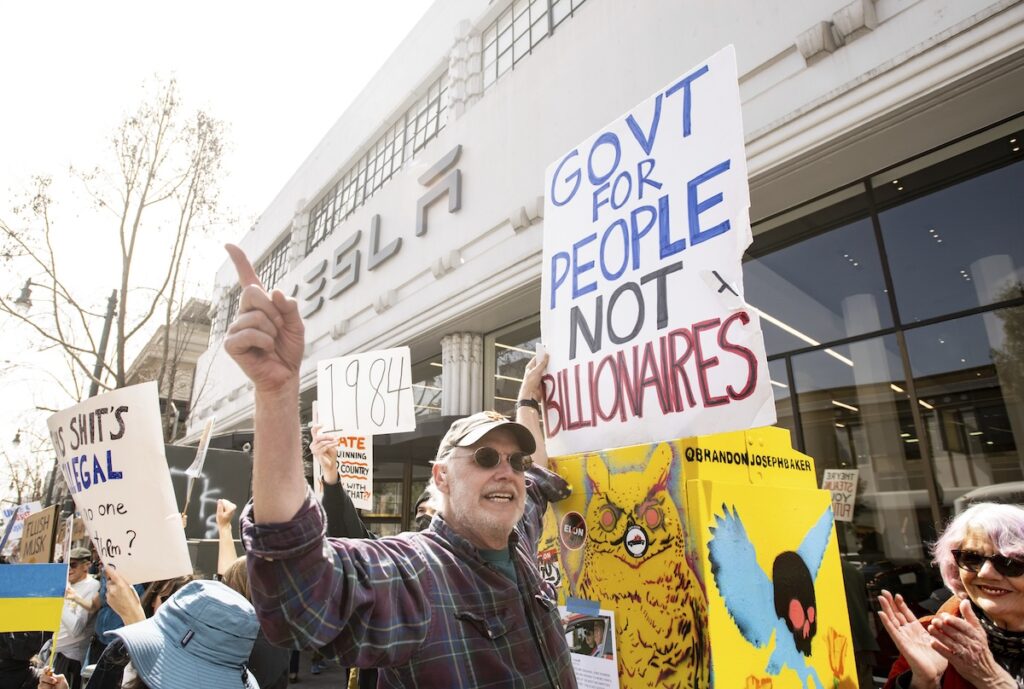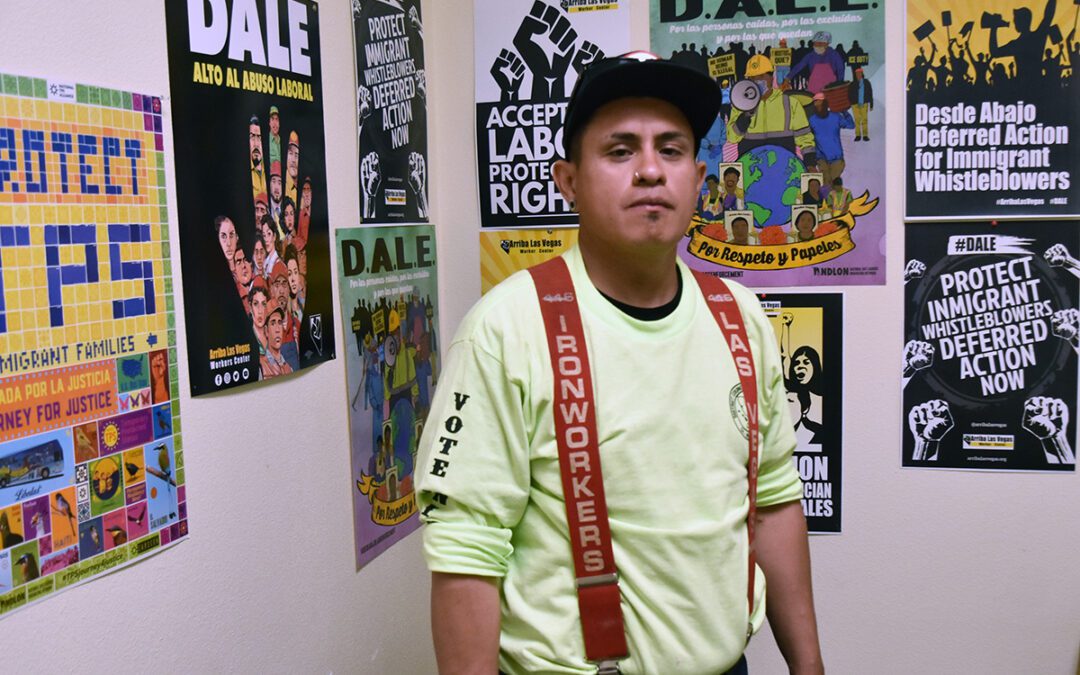
Mark Crosley holds up a sign and yells during a protest outside a Tesla dealership in San Francisco, Saturday, March 15, 2025. (AP Photo/Josh Edelson)
Growing up, my dad only made two rules for me outside of my chores. The first one was that I wasn’t allowed to make soap with lye. Glycerine soap, vegetable soap– these were okay. My dad had blown his thumbnail off as a kid packing gunpowder into the trunk of a toy car, so he’s exceedingly cautious about things that burn or explode. I’ve only made soap once in my life, so this has been an easy rule to follow.
His second rule was that no one in the family can buy stocks. He’s a Monday-to-Sunday hardworking guy and told me that it’s just not okay to make money off someone else’s labor. No further discussion needed.
Now, whether you agree with my dad about how stocks work or not, he’s not wrong that we live in a society where some people work their butts off and other people get rich. My dad raised us to work hard and do good for our families, but he was also going to make damn sure we didn’t step on anyone else along the way.
When I was ten, my dad didn’t get paid for a big job, but he didn’t have the money to sue for what he was owed. Another time, he and a co-worker found out they were the only active job site for their company, and soon enough, the company declared bankruptcy, leaving them out to dry while the owners protected themselves, liquidated assets, and walked away to start a new company. I grew up clear on who was on our side and who wasn’t, with a keen sense of who will pocket the profit at the end of the day.
That’s why when I see Teslas for sale on the White House lawn or hear pundits yelling at me as if it were a Honduran immigrant who hiked up my rent, I’m hot onto their business plan. I’ve spent enough time in the Southern coal fields to know about extraction; I’ve seen enough homes left to rot to know there’s money to be made through not meeting everybody’s needs. I understand that the reason the owners at the Hamlet Chicken Processing plant locked the doors and let 25 people burn to death is because the product was more valuable to them than the people who worked there.
No further discussion needed.
When we allow corporate money to run rampant over our lives, working people get hurt every time. I recently talked to Nicole Scarpa in Roswell, New Mexico, who had joined her neighbors in filing complaints about the lack of running water in their apartments after the out-of-state, corporate landlord refused to make repairs. Nicole described how the city condemned the building and gave the residents seven days to move. “We didn’t get our deposits back,” she says, discussing how the landlord’s negligence cost the residents money. “The mother who lived next to me was only 19, and she had just paid up all her back rent days before we got thrown out. She had no money left to move. I still don’t know what happened to her.”
Nonetheless, we let corporate money talk, like it were God himself, in our politics. In Idaho, the private equity firm Wonderschool has just convinced a local lawmaker to introduce a bill to eliminate– eliminate– child to caregiver ratios in childcare to increase their profit margins. Now, I used to work in daycares, and I know this is an obscene idea, but Heidi Borland from Idaho Falls, a mom of a sweet little girl with high medical needs, says it best: “Legislators are supposed to represent their constituents. This bill was not created by the request or concerns of Idaho constituents. It’s time we draw the line and let our legislators know that families are always more important than some companies’ bottom line.”
But still– after big banks tanked our economy and big pharma flooded Appalachia with generation-destroying drugs– we act like for-profit models are somehow the best we can get. In Wisconsin, local nursing home residents are in a year-long fight to save their publicly-owned nursing homes from being sold to profiteers, even though the quality of care plummets when LLCs and private equity take over compared to when they stay community-run. In a recent Letter to the Editor, Sauk County resident Judy Brey describes the situation in her county this way: “Our nursing home has a long history of 5-star Medicare ratings, and the board voted to sell it to a private, for-profit company, Aria, which has some health care facilities with 1- and 2-star ratings. The board agreed to sell our nursing home, which cost taxpayers $15 million to build in 2009, for a mere $5.1 million.”
The greed is transparent; the failure of privatization and the insatiable pursuit of corporate profits to help working class people is obvious.
But Nicole, Heidi, and Judy aren’t taking this lying down. Each is fighting back. Nicole has been one of the brains behind an innovative, out-of-the-box, affordable rental project in Roswell. Heidi is organizing with other moms nationwide to push back against private equity and fight for children and childcare. Judy and her neighbors are showing up at their County Board in growing numbers – and have filed a citizen lawsuit– to stop the nursing home sale.
I’m a grown woman with a nearly grown son, but to this day I’ve followed my dad’s rules. Moreover, I’ve taken his lessons to heart and can see what’s in front of me. So when billionaires are tearing up our federal government so it can be sold for scraps, I’m not confused by what is happening. When the workers at a North Carolina Amazon warehouse tried to unionize because they were tired of peeing in bottles while on the job, I was all in. When the Blackjewel miners blocked the tracks in Kentucky, saying no more coal would roll out of those hills until they got paid, I knew whose side I was on.
Americans are right: The game is rigged. If I could add a rule to my dad’s list, it might be this: Don’t stump for the billionaires because they’ll never, ever stump for you.
This commentary was shared with permission of the author, Gwen Frisbie-Fulton, whose Substack, “Working Class Storytelling,” is one of our favorites. Gwen also writes a monthly opinion column exclusively for us, too, so be sure to keep an eye out for it here.

Apprenticeship programs are helping Nevadans launch their careers
The number of registered apprentices in Nevada has more than doubled over the past decade and a recent surge of funding from the Biden...

While corporations make billions, inflation continues to hurt Nevadans
Grocery and food companies’ massive profits have drawn increased scrutiny from lawmakers, including Nevada Sens. Jacky Rosen and Catherine Cortez...

El Día Internacional de los Trabajadores fue dedicado a los varilleros
Este año, Arriba Las Vegas Worker Center conmemoró el Día Internacional del Trabajador con una caravana de acciones en las que destacaron...

Biden makes 4 million more workers eligible for overtime pay
The Biden administration announced a new rule Tuesday to expand overtime pay for around 4 million lower-paid salaried employees nationwide. The...

Biden administration bans noncompete clauses for workers
The Federal Trade Commission (FTC) voted on Tuesday to ban noncompete agreements—those pesky clauses that employers often force their workers to...

Sens. Jacky Rosen and Catherine Cortez Masto join efforts against Big Oil consolidation
The senators point to the recent consolidation of Big Oil companies as potential violations of antitrust law, imploring the Federal Trade Commission...




